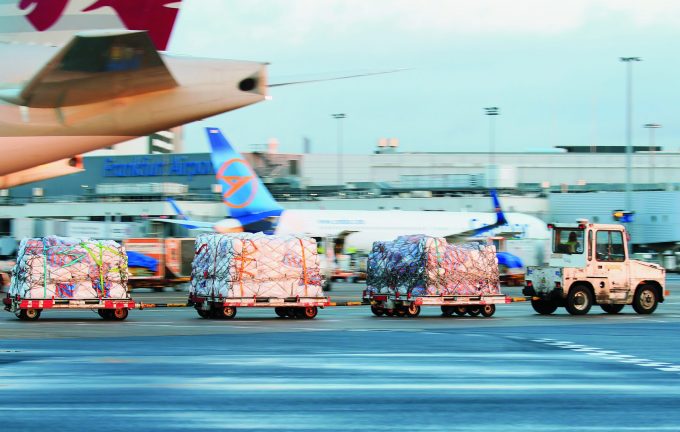East Midlands poised to become 'UK's most important' express air freight hub
East Midlands Airport (EMA) is poised to become “the UK’s most important express air freight ...

PRESS RELEASE
Strategic development in line with growing demand – Three key initiatives comprising digitization and process innovation, space optimization, and space development
FRA/gk-dh – Airport operator Fraport is strategically aligning its Frankfurt hub with forecast growth in the air cargo business. Driven by growing global trade, the air cargo industry is expected to further expand over the medium and long term both globally and within Europe. The Frankfurt CargoHub is projected to follow this overall market trend, with airfreight volumes in Frankfurt forecast to exceed three million metric tons by 2040. This represents an increase of around 50 percent on the previous peak reached in 2021. At the same time, the entire logistics sector faces major challenges, particularly in relation to altered goods flows, digitization, and sustainability.
Dr. Pierre Dominique Prümm, Fraport AG’s Executive Director for Aviation and Infrastructure, said: “Given the expected growth and changing requirements, now is the right time for a comprehensive innovation and investment package. We’re developing our airport sustainably and in line with actual demand. This is why we’re launching the CargoHub Masterplan. Our aim is to position the Frankfurt CargoHub for the future – thus making a clear contribution to growth in the state of Hesse as an economic powerhouse in the heart of Germany and Europe.”
New masterplan rests on three pillars
Fraport’s aim is to continuosly ensure Frankfurt Airport’s position as Europe’s #1 CargoHub by freight throughput. To achieve this, the masterplan involves three key initiatives for developing the FRA location: digitization and process innovation, space optimization, and space development.
In other words: Fraport is adopting comprehensive digitized processes in order to boost efficiency further and to facilitate straightforward, seamless, and transparent logistics. A key aspect of the transformation is the Cargo Community System, which uses data-driven dashboards and analysis to give participating companies real-time insights and smart management options. To develop the system further, Fraport and software developer DAKOSY have formed a joint venture called allivate. A roadmap has already been agreed upon with the cargo community that will accelerate the digital transformation for cargo even further.
Fraport also plans to redesign and develop existing spaces inside CargoCity South. The plan is to swap flight-operations areas and cargo spaces to free up 43,000 square meters of additional cargo space that will have a direct connection to the apron. The move will also create 20,000 square meters of additional space for ground handling and special services. Under the plan, the 18 affected aircraft positions will remain available in the future, albeit under a new arrangement. Fraport is undertaking intensive discussions with the appropriate regulatory authorities about the change and will initiate the necessary zoning modification process shortly.
Given the growing cargo volumes, Fraport is also planning to expand its capacities for logistics handling in a way that matches particularly the needs of cargo. The vision is for a new LogisticsHub West that draws on sustainable, digitized, and smart infrastructure to be built on the site of the former Ticona plant on the airport’s western flank. The development is to happen in two stages: From 2028, logistics facilities are to be made available that include up to 150,000 square meters of warehouse space built on a site totaling around 250,000 square meters. Operational facilities for other airport functions will occupy a further 35,000 square meters. The basis for this is the existing zoning plan. Due to its vicinity to the Northwest Runway, the location also offers the potential for a connection to the airport’s airside area. In the long-term, after 2030, there is also the option of developing the LogisticsHub West into a trimodal hub that includes road, rail, and air connections.
Development in partnership with the Cargo Community
“When developing our plans, we’re always considering the needs of our customers and partners but also those of our neighbors. We’re communicating transparently to develop the airport sustainably and in a way that works for everyone,” said Max Philipp Conrady, SVP Cargo Development and Management at Fraport AG. “The guiding principle for our vision is ‘Creating the Future of Cargo Together’: that’s because the development will only work if we cooperate with everyone affected, particularly the local cargo community.”
Dietmar Focke, Chief Operations and Human Resources Officer at Lufthansa Cargo AG and a member of the Executive Board at Air Cargo Community Frankfurt e.V. commented: “We welcome the planned measures, because they are providing solutions for the current challenges faced by the industry. There is a growing demand for digitization and automation within the community. We need timely, digital processes – particularly for the growing e-commerce business. At Lufthansa Cargo, we’re boosting and updating our presence at the Frankfurt hub by investing €500 million in our infrastructure. We’re also ordering new cargo aircraft. These decisions underscore our commitment to Frankfurt.”
FRA handles more cargo annually than any other European cargo hub. All major companies in the global logistics industry operate from Frankfurt Airport. By working together with the cargo community, Fraport provides a full-service portfolio for the secure, rapid, and efficient handling of all types of cargo. The CargoHub masterplan is part of the Group’s overall strategy “Fraport.2030”.
For more information about the masterplan and regular news updates, visit www.frankfurt-cargohub.com.
Comment on this article